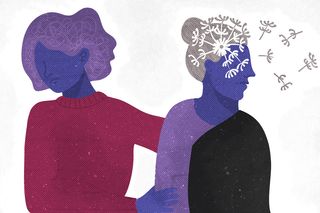
What It’s Like To Live With: A Mother With Alzheimer’s
“One can’t expect me to be kind and empathetic at all times. I’m human, too.”

What It’s Like to Live With explores the stories of the loved ones living with and/or caring for people who see and experience every day a little differently.
My mother has been an Alzheimer’s patient for about seven years now. My son is now 10. I mention him for two reasons: first, because there practically is no difference in the way the two behave or in the way I need to care for them. And second, just when I thought I’d get some help from mom with my son, she got diagnosed with Alzheimer’s. Since then, life has been really challenging. I got her to live with me because I knew she would need long-term care, as the disease would progress with her becoming less able to do things and becoming more dependent on me.
I had first employed a caretaker, separate ones for both, but they weren’t efficient at all. My son’s caretaker, I found out one day, was eating food when my son refused to eat it rather than feeding him something else he likes. And my mom’s was just careless. After giving my mom a bath every morning, she’d keep sleeping until lunchtime, feed mom lunch and sleep again. She wouldn’t bother to check my mom’s diaper, or whether mom needed to do something else. One day, after I got back home from work, I found my mom lying down on a wet bed. The caretaker hadn’t even bothered to make her drink the juices I had made, and they were all stacked in the fridge as I had left them. I fired them both on the same day and then sat down to write my own resignation letter. Although my organization was very understanding and even offered me a work-from-home option, I knew I needed time to settle before I could take them up on their offer. Had it not been for my husband’s support, both emotionally and financially, I wouldn’t have made it this far. A special mention also to my mother-in-law, who on seeing the amount I had on my plate with these two, offered to stay with my brother-in-law more often than she would have stayed with us.
Next, I hired a full-time house help and a nurse. Their presence helps me get by through the day and the chores, maybe reduces the physical burden on me, but overall, it has been a frustrating journey.
Initially, it was hard to stay calm. It was weird because when my son would have trouble communicating, I wouldn’t have a problem helping him find the right word or help him form his chain of thought because he was still learning to talk then. But when mom was struggling to do the same, I would get frustrated because, in my head, she was old enough to be doing these things on her own. I realized that I needed to be gentle and patient in the way I was communicating with her, rather than getting agitated or being impatient with her.
The next set of challenges came when a few months later, she also started experiencing hallucinations. Talking her out of these became extremely difficult. She would make up stories about random people visiting our house, or about how a certain medicine was giving her a stomach ache when in reality, that wasn’t the case at all. A couple of times, she also flung whatever she found. This has broken glassware in our showcases, almost hit the television and my son once.
Related on The Swaddle:
Why Alzheimer’s Is a Woman’s Disease
It’s really difficult to control arguing or shouting at her. And as a result of this, I think I’m becoming very short-tempered. This is also affecting the way I’m bringing up my son because I think I remove all of my mother’s frustration on him. One can’t expect me to be empathetic and kind at all times; I’m human, too. And just because she’s my mom, it doesn’t mean I can’t shout or show my anger.
It’s even more frustrating when I have to step in to do the little and simple things for her, like making her wear her clothes, close and open buttons. I compare it to my 10-year-old, who can now do these things easily. Every time I try to talk about my feelings with someone, they’ll only tell me that she’s sick, or that she’s my mother. It’s okay, and I get it; I know she’s helpless, too. But what about what I’m feeling in the moment? Sometimes, when I have a few seconds for myself, I also think I might have depression, but I’m delaying seeing a therapist because, at this point, I won’t be able to handle one more thing.
I also know all of my frustration and anger towards her is momentary. When I see her asleep or listen to me talk, even though I know she wouldn’t remember any of it, I tell myself, how can I get angry with my own mother? I feel helpless. It’s very easy to get stressed and irritable in the spur of the moment. I think it comes from not having enough downtime for myself and not having enough channels to remain distracted or to vent. Over the years, I’ve lost a lot of friends because I’ve not been able to go out that often, or call them over. I don’t even have colleagues to spend my day talking to. I now know the importance of those little chai breaks, and sometimes, even regret every time I canceled a plan with them.
The little chances I have at socializing — say, dropping my son to school or taking him for birthday parties — is shared by either the caretaker or my husband because I can’t leave my mom for long stretches of time. I don’t even remember the last time we went on a holiday and I know my son and my husband might be feeling the voids, too. Forget holidays — I don’t know what a date night or a family dinner feels like.
But I’m very grateful to everyone for being so understanding — to my mom-in-law who comes and takes my son away for small getaways, and to my husband for never making me feel inadequate or incapable of not being able to multitask when I myself feel like I just can’t. Now, I see this as payback to my mother — for everything she’s done for us. From leaving her own job to sacrificing so many business trips abroad with my father just to ensure we would be okay and to manage us. There are no regrets, just one desire: I wish she had lived the last few years of her life hale and hearty and taken every memory with her, rather than leaving them here.
This interview has been condensed and edited for clarity. As told to Anubhuti Matta.
Anubhuti Matta is an associate editor with The Swaddle. When not at work, she's busy pursuing kathak, reading books on and by women in the Middle East or making dresses out of Indian prints.
Related


A 10‑Month Ban on Selling Sugary Drinks at a Workplace Led to Reduced Fat, Cholesterol in Employees
